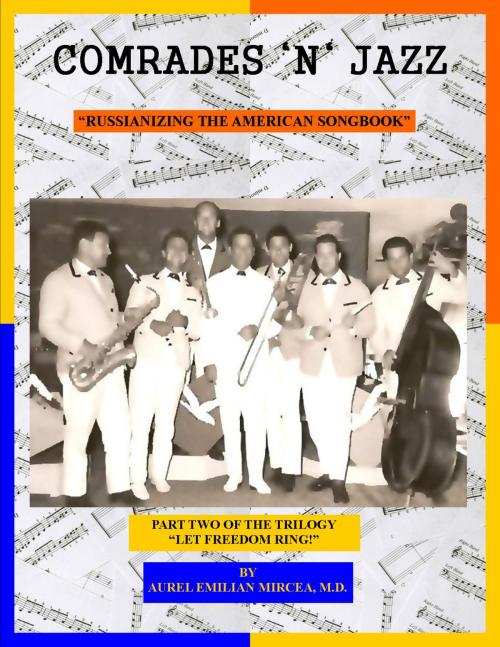| Author: | Aurel Emilian Mircea, M.D. | ISBN: | 9780985869311 |
| Publisher: | BookBaby | Publication: | November 21, 2013 |
| Imprint: | Language: | English |
| Author: | Aurel Emilian Mircea, M.D. |
| ISBN: | 9780985869311 |
| Publisher: | BookBaby |
| Publication: | November 21, 2013 |
| Imprint: | |
| Language: | English |
Onstage at the annual Jazz Fest in New Orleans, Victor, the bandleader of the Hearts & Souls, gave the signal for the opening number. The dream about a celebratory concert he and his buddies had been waiting for more than forty years had become a reality. During the Cold War, all but one of the seven medical students and jazz musicians defected to the West. There, in freedom and prosperity, they continued their love for the Great American Songbook. After the drummer gave the eight-bar introduction to “Caravan” by Duke Ellington, a chill went up the spine of the seven Comrades ‘n‘ Jazz. The melody, the most memorable piece from their old repertoire, had always been their signature tune. During their earlier showbiz career in Romania, foreign music had been marred by strict censorship, which they had successfully circumvented by “Russianizing” the titles of the songs and the names of the American composers. Victor mixed showbiz and medicine lucratively back then, by making a pact with a musically ignorant party hack in charge of their artistic activities on campus. The zealot supervised the dance band rehearsals and public appearances without having a clue as to what kind of music they were actually performing. For years, he remained convinced that the Hearts & Souls paid tribute to the communist dogma. Alas, toward the end of their medical school, the band was exposed for what it really was: a Jazz Band. The party leaders cancelled all future shows on campus, and threatened with further retaliation. But the jazz-loving band members continued their stealth love for the Great American Songbook by joining similarly minded musicians in the professional world of showbiz, far away from the college censors. Local impresarios adopted the seven medical students with open arms, offering them the best venues in the country. Victor and his buddies joined the Music Bourse—Bucharest’s freelance musicians market. Its members held secret rallies in public parks or secluded beer gardens, giving birth to an ardent desire to defect to the West, by hook or by crook. The Hungarian Uprising in the late fifties gave the Hearts & Souls’ pianist the first opportunity to defect to Austria, through the minefields. A couple of years later, fed up with the tyranny, the bass player and the guitarist took off to Istanbul in a makeshift raft, floating perilously on the Black Sea. Then the trombone played packed his bags and left for Israel, along with tens of thousands of Jews emigrating from the Soviet bloc. The Hearts & Souls’ existence came to an end when the clarinetist swam across the Danube River to Serbia, walking all the way to Italy. Not wanting to risk his life, Victor chose to marry a visiting Polish recording star, and was heading to Warsaw. In Victor’s last moment on Romanian soil, his old nemesis showed up at the airport, demanding a halt to his departure. Inside an interrogation room, a violent confrontation ensued, and the famous bandleader and freshly-graduated physician escaped from detention. Over four decades have passed since then. The Evil Soviet Empire became a sad chapter in modern history, together with the Iron Curtain. The Comrades ‘n‘ Jazz were now free to play the Great American Songbook’s music to their hearts’ content. Victor organized a grandiose reunion of the seven brothers-in-arms. Where in the whole world would such a celebration be more appropriate than in New Orleans, the birthplace of jazz?
Onstage at the annual Jazz Fest in New Orleans, Victor, the bandleader of the Hearts & Souls, gave the signal for the opening number. The dream about a celebratory concert he and his buddies had been waiting for more than forty years had become a reality. During the Cold War, all but one of the seven medical students and jazz musicians defected to the West. There, in freedom and prosperity, they continued their love for the Great American Songbook. After the drummer gave the eight-bar introduction to “Caravan” by Duke Ellington, a chill went up the spine of the seven Comrades ‘n‘ Jazz. The melody, the most memorable piece from their old repertoire, had always been their signature tune. During their earlier showbiz career in Romania, foreign music had been marred by strict censorship, which they had successfully circumvented by “Russianizing” the titles of the songs and the names of the American composers. Victor mixed showbiz and medicine lucratively back then, by making a pact with a musically ignorant party hack in charge of their artistic activities on campus. The zealot supervised the dance band rehearsals and public appearances without having a clue as to what kind of music they were actually performing. For years, he remained convinced that the Hearts & Souls paid tribute to the communist dogma. Alas, toward the end of their medical school, the band was exposed for what it really was: a Jazz Band. The party leaders cancelled all future shows on campus, and threatened with further retaliation. But the jazz-loving band members continued their stealth love for the Great American Songbook by joining similarly minded musicians in the professional world of showbiz, far away from the college censors. Local impresarios adopted the seven medical students with open arms, offering them the best venues in the country. Victor and his buddies joined the Music Bourse—Bucharest’s freelance musicians market. Its members held secret rallies in public parks or secluded beer gardens, giving birth to an ardent desire to defect to the West, by hook or by crook. The Hungarian Uprising in the late fifties gave the Hearts & Souls’ pianist the first opportunity to defect to Austria, through the minefields. A couple of years later, fed up with the tyranny, the bass player and the guitarist took off to Istanbul in a makeshift raft, floating perilously on the Black Sea. Then the trombone played packed his bags and left for Israel, along with tens of thousands of Jews emigrating from the Soviet bloc. The Hearts & Souls’ existence came to an end when the clarinetist swam across the Danube River to Serbia, walking all the way to Italy. Not wanting to risk his life, Victor chose to marry a visiting Polish recording star, and was heading to Warsaw. In Victor’s last moment on Romanian soil, his old nemesis showed up at the airport, demanding a halt to his departure. Inside an interrogation room, a violent confrontation ensued, and the famous bandleader and freshly-graduated physician escaped from detention. Over four decades have passed since then. The Evil Soviet Empire became a sad chapter in modern history, together with the Iron Curtain. The Comrades ‘n‘ Jazz were now free to play the Great American Songbook’s music to their hearts’ content. Victor organized a grandiose reunion of the seven brothers-in-arms. Where in the whole world would such a celebration be more appropriate than in New Orleans, the birthplace of jazz?















